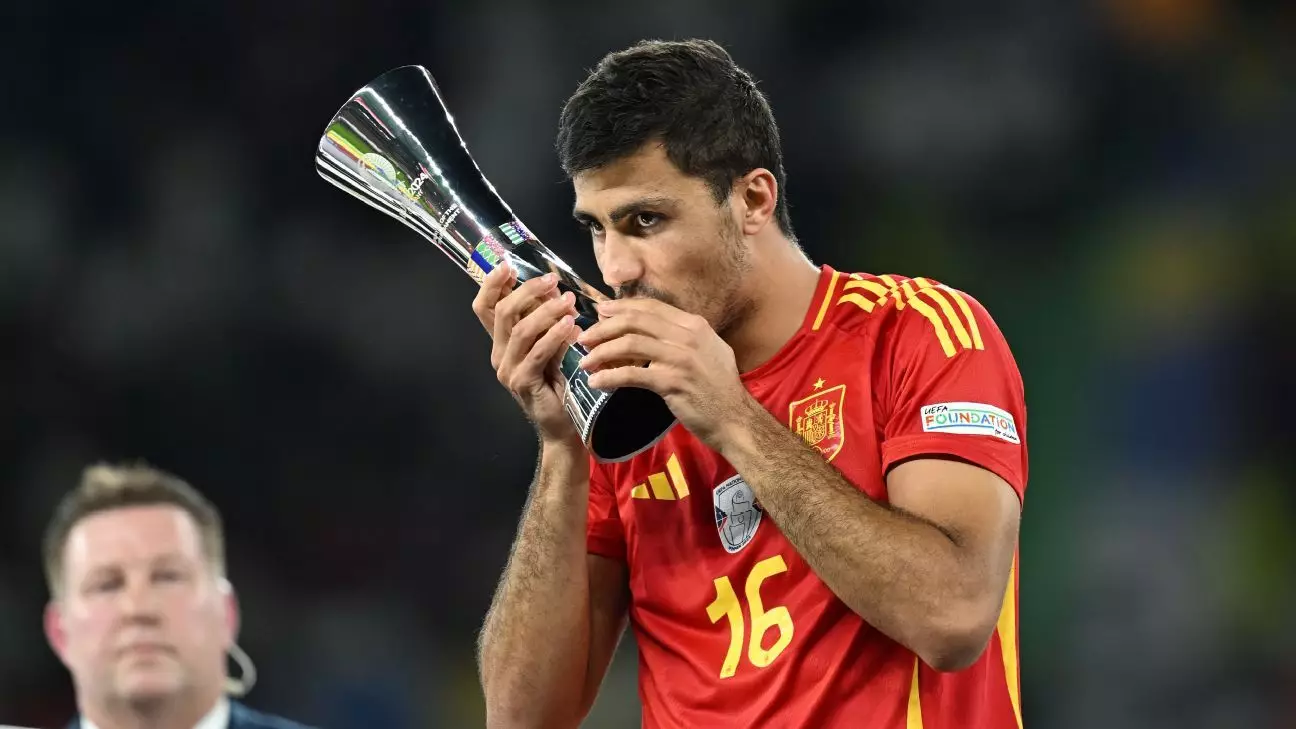In a landscape dominated by footballing giants, the pursuit of the Ballon d’Or represents not just personal glory for players, but a reflection of national pride. This year, Manchester City’s midfielder Rodri has emerged as a notable contender for the prestigious award, igniting discussions around Spain’s long wait for the accolade. With his powerful performances for club and country, Rodri is not just a player to watch; he embodies the dreams of a generation of Spanish footballers yearning for recognition on the global stage.
Having recently returned from a triumphant Euro 2024 campaign where he was named Player of the Tournament, Rodri’s ascent to the forefront of the conversation around the Ballon d’Or is not merely coincidence. Spain has historically been rich in footballing talent, yet a Spanish male has not claimed the award since Luis Suarez in 1960. Rodri’s ambition to end this drought is not just a personal goal; it resonates with national pride and the desire to see Spain’s footballing history acknowledged in a way that only a Ballon d’Or victory can achieve.
Rodri’s Rationale: Analyzing the Competition
Throughout his career, Rodri has been compared to legends like Andrés Iniesta and Xavi, two midfield maestros who undoubtedly left their mark on the game but never clinched football’s highest individual honor. In addressing this, Rodri wisely notes the unprecedented era dominated by Lionel Messi and Cristiano Ronaldo, who overshadowed many with their sheer brilliance. Yet, he argues that Spain deserves more recognition, vividly illustrating the dichotomy between collective success and individual accolades in football.
Rodri’s perspective offers a refreshing insight into the psyche of a player shaped by history yet keenly aware of the present. His acknowledgment of Vinícius Júnior, Rodri’s main rival for the Ballon d’Or this year, demonstrates a balance between admiration and aspiration. Vinícius, fresh off a double-winning season with Real Madrid, embodies contemporary excellence, reinforcing the competitive nature of the midfield landscape while simultaneously validating Rodri’s own efforts. The rivalry here is not one born out of animosity but rather mutual respect, common among elite athletes.
The Emotional Weight of Recognition
In his conversations with fans, Rodri finds motivation and validation. The sentiment that he should win the Ballon d’Or reflects a broader anticipation within the Spanish football community. For him, this recognition transcends mere accolades; it is symbolic of the hard work, tenacity, and commitment he has dedicated to his craft. Rodri’s humility shines through as he notes that their belief in his capabilities already makes him feel like a winner, highlighting the importance of fan engagement and emotional connections in sports.
His sentiments underscore a vital truth: success in football isn’t borne merely out of individual talent, but rather an interconnected web of support, hard work, and belief. Rodri’s journey from Atlético Madrid to the heights of Manchester City is a testament to this, as is his role in Spain’s recent European success.
As the footballing season picks up pace, Rodri looks forward to contributing to Manchester City’s campaign as they vie for a fifth consecutive Premier League title. After a well-deserved break post-Euro 2024, his return is highly anticipated. With the Premier League becoming increasingly competitive, Rodri acknowledges the challenges posed by teams like Arsenal and Liverpool. Both sides have displayed resilience, and their ability to push City to the limits exemplifies the depth and competitiveness of English football.
Rodri’s analytical approach to assessing rival teams speaks to his experience and strategic mindset. He recognizes the nuance of sustaining performance levels over multiple seasons, a trait that separates elite teams from the rest. This humility, coupled with ambition, encapsulates Rodri’s character as he balances the pressure of individual accolades with a focus on collective success.
As anticipation builds for the Ballon d’Or announcement, Rodri’s words resonate deeply: to be included in the conversation alongside football’s greats is a victory in itself. Whether he takes home the coveted award or not, his presence in this discussion signifies an evolving narrative for Spanish football. Rodri’s journey intertwines personal aspirations with national pride, and as fans rally behind him, the hope remains that one day, the Ballon d’Or may return to Spain, elevating not just one player, but a legacy of football that has long desired its place in history.
In the end, whether or not Rodri claims the award, his influence on the game and embodiment of contemporary football principles will echo long after the trophies are awarded. His story is just beginning, illustrating that with ambition and hard work, dreams can set the stage for greatness, forging pathways for future generations.

